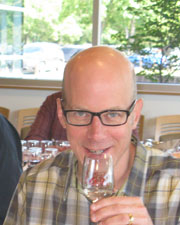Doug Frost in KC Star on Organic Wine
Kansas City based Master Sommeleier Doug Frost wrote an excellent column in the Kansas City Star last week about organic wines and gives a surprise mini nod to biodynamics. Rudolf Steiner fans can see more in the full column below. Update: The original link to the column in the KC Star is now dead, so the article has been forwarded to us courtesy of the “wine dog boy” himself Mr Frost:
How Organic is Your Wine?
Despite some people’s whinging about government regulation, there is at least one area in which its touch has been too light to discern: the meaning of the term organic. Foodstuffs labeled as ‘organic” might reasonably be thought to exclude products that are produced with genetically modified compounds, pesticides and fungicides, but U.S. law allows 5% of non-organic ingredients in any product labeled as ‘organic.” Maybe that’s sufficient to encourage farmers to eschew chemical inputs and to help consumers find products that reflect their hopes and beliefs in a more sustainable earth.
But in wine, when the government has tried to bring light to a dark corner, some of us think it has been facing the wrong direction. To be called ‘organic wine” by U.S. standards, a wine isn’t supposed to have any more than ten parts per million of sulfur, a number that not only precludes the addition of sulfur in the winemaking process, but excludes those wines that naturally produce trace amounts of sulfur during fermentation. The law turned strict about this issue a few decades ago when some asthmatics had life threatening reactions to the excessive sulfur used on some salad bars. Gotta keep that lettuce green.
So naturally the law went after wine. Alcohol’s enemies are opportunistic; it was a chance to punish wine for its centuries-long, minimal uses of sulfur, even if salad bars and dried fruit packagers were guilty of using five or ten times greater amounts of sulfur. The label ‘Contains Sulfites” was mandated for virtually all wines sold in the U.S. In Europe, the cradle of wine, no such rule exists and while European wines sold in the U.S. must state that they ‘Contain Sulfites”, no such requirement exists overseas. I have met innumerable consumers who advise me that the wines in Europe are so much better, since ‘they don’t have sulfites”. Au contraire; they simply don’t tell you about their sulfites.
But there’s the rub: sulfites aren’t really the issue. Used since Roman times to combat oxygen’s deleterious effects upon wine and its vibrancy, sulfur serves a purpose that Europeans accept, so they allow their ‘organic wines” to contain sulfur. Not so here. And without sulfur, even the tiny amounts typical in wines (say, 30 to 50 parts per million), wine will struggle to retain its freshness. Some American wineries, such as Mendocino’s Frey Vineyards, have built their business upon making wines that can be genuinely labeled as ‘Organic wines”. They can be delightful, but don’t age them too long; I believe that they need to be consumed fairly young to keep the tasty fruit inside the
bottle.
More pertinent to Europeans and Americans alike should be the term that is cropping up of late: ‘Made from Organic Grapes.” Again, there may be too much wiggle in it, but in order for a vineyard to be certified organic, it must have been free of synthetic chemicals and pesticides for several years. There are now thousands of producers around the world who have made the decision to forgo chemical inputs in their vineyards and there are enough organic grapes that a movement is in full ferment. It’s worth a look in your local store; you’ll find wines that boast of their organic grape origins.
Increasing numbers of wineries use grapes from vineyards that may not be willing to pay the costs of applying for ‘organic” status but that are grown in the same way nonetheless. Some use terms such as ‘sustainable farming” or belong to non-governmental organizations, like Demeter, and may be even more doctrinaire in their approach to nonchemical farming. Amongst the most dedicated are Bio-dynamic farmers, whose practices are based upon the century old writings of Austrian Rudolf Steiner and whose activities are often lampooned by the mainstream media, even among wine magazines. Yes, Bio-dynamic farming includes some oddities: fresh manure is important, as are phases of the moon. I will never maintain that Bio-dynamic farming makes better wine, but you can smell the difference in the vineyards, and you can often taste a difference in the wines. A good difference.
As important as proper stewardship of the earth may be to many winegrowers, the proof ought to be in the glass. Any of these practices may result in good wine; but bad winemaking can ruin any good grapes. And, of course, flavor is subjective. What is not in question is that chemical free winemaking and winegrowing is likely to produce the most sustainable industry, and with some of the world’s greatest vineyard in use for centuries, there’s some merit in that.
Some Wineries to Look For:
California: Benziger Fanily, Bonterra, Frog’s Leap, Grgich Hills, Robert Sinskey
Washington: Badger Mountain


